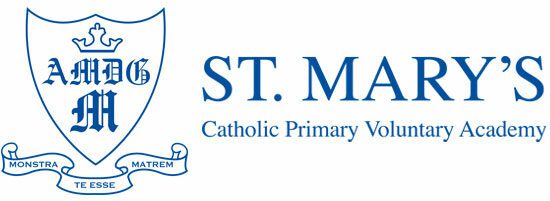SEND
SPECIAL EDUCATIONAL NEEDS AND DISABILITIES (SEND)
SEND Coordinator: Mrs Stacie Barnsley
Please contact via the school office.
We value all in the name of Jesus the Christ
Intent
As our Mission statement sets out, every child at Saint Mary’s Catholic Academy is to be valued and supported. We are proud of their successes and seek to encourage each and every child in our caring school community to achieve their very best in all areas of school life. We seek to recognise the skills and talents of all across the curriculum. For those children who have difficulties in accessing any part of school life, we employ the Graduated Approach for SEND to enhance our Quality First Provision.
The intent of Special Educational Needs and Disability (SEND) provision at Saint Mary’s Catholic Primary Voluntary Academy based on the principle of supporting children with an identified need and their families to ensure that all pupils with SEND experience success; achieve well and develop as confident individuals. It is our intention that these pupils will receive a high-quality, stimulating, engaging and ambitious curriculum irrespective of of need or disability. We firmly believe in the importance of removing barriers, taking practical steps so that our environment, facilities, curriculum and practices are accessible to all. We pride ourselves on early identification and intervention for SEND, ensuring that progress is tracked regularly and adjustments made in provision in light of a renewed approach to ongoing monitoring. Our aims include ensuring that the whole community including pupils, parents and staff have a firm belief that all pupils, including those with SEND are capable of achieving and are equipped with the tools needed for this. We want to ensure our SEND children become life-long learners that are creative, curious and independent both in school and the wider community. We are responsive when it comes to solutions to meet our children with SEND’s needs. The children are given the opportunity to voice their wishes as we work in partnership with our children and of course, draw on the knowledge and expertise of parents and carers in relation to their child. Furthermore, we work closely with a range of other agencies to ensure a well-thought-out approach is enlisted. We provide an accessible learning environment with reasonable adjustments made in our broad and balanced to differentiate according to need. We provide opportunities for children to develop confidence, self-esteem and develop resilience with their learning.
At all times we comply with the SEND Code of Practice (2014) and the Equalities Act (2010) to ensure we meet the needs of our children
Implementation
SEND is a whole-school responsibility. Assessing, planning and teaching is a continuous cycle that all teachers are involved in. It is during this time that teachers consider the abilities, aptitudes and interests of the pupils and who might require increased levels of support and provision. Pupil with SEND are included in all school activities and aspects of the school day. Reasonable adjustments will then be made when needed. All stakeholders have high aspirations for children with SEND and their contributions are valued. Children with SEND will be provided with quality first teaching whilst being encouraged to work independently and make progress at their level. At Saint Mary’s Academy we support a learner with additional needs using the Graduated Approach. Each learner with their parents/guardians are at the centre of this approach and are fully involved at each and every stage with a focus on both well-being and academic achievement.
All children are entitled to Universal Support from their class teacher through high quality first teaching. This includes: high expectations and aspirations for all children, secure subject knowledge, clear presentation, promoting discussion, systematic checking of understanding, identifying and addressing misconceptions through clear feedback, adaptation of teaching as necessary, building upon previous learning and revisiting to support children to remember content in the long term, designing learning environments to support learning.
If a child does not make progress in line with expectations, and further support is required, the class teacher will discuss the matter with the school SENDCo and then discuss this the concern with parent to explain how additional support in the classroom will be created to help with the problem identified. The class teacher will implement a support package and where possible enlist home support to work together to help.
This will be reviewed following a period agreed between parents, child and teacher to consider whether the support has quickly helped the child to get on track with their learning, (which may have been a particular misconception or a specific barrier that had not been apparent at the start of the process.) They are deemed as requiring ‘SEN Support’ and the SENDCo will carry out observation and further assessment and create a package of advice and suggested reasonable adjustments to support with the barriers to learning identified using the information from staff, parents and the child. They may need individualised intervention and support programmes and recommended strategies which will be recorded on their SEND plans. The SENDCo will endeavour to use research based strategies to ensure the best possible outcomes. At this point the child may be placed on the SEND register if parents/guardians feel this is appropriate. The child will be given provision which is different from and additional to their peers.
Following this, external agencies may then be called upon to seek further advice and assessment. These agencies will then be involved in, at least termly, in a plan/do/review meetings alongside parents/guardians and suggest outcomes to meet the child’s needs. This is Targeted Support.
Finally, if a pupil has a high level of need and it is deemed necessary by all professionals and parents supporting the child, an application for an Education, Health and Care Plan assessment would be required. This will involve a multi-agency evaluation of the plans and provision through ongoing assess/plan/do/review cycles. This is Specialised Support.
Parents are involved at every stage when deciding the best approach for their child. we encourage parents to share their concerns and signpost them to access support or information that they may need. Equally, we believe that the Learner should be at the heart of this process, we value the importance of involving each learner in the right to have their views and opinions incorporated into the assessment and review process. All of our children with SEND will be involved, wherever possible and appropriate, in review discussions as part of the process and in setting their targets. This may be through their views being brought to be shared at meetings or by the child’s attendance.
Saint Mary’s Catholic Primary Voluntary Academy can call upon the external expertise of a plethora of agencies, including:
- Child Development Centre: This Service is part of the NHS provision and offers expert observation and advice regarding early intervention needs for children in Early Years.
- Local Authority based Specialist Advisory Service: This Service provides assessment, planning for support advice and review for children who have needs in: Cognition and Learning, Behaviour including Social, Emotional and Mental Health Needs and Communication and Interaction.
- Educational Psychology Service: for a variety of Cognition and Learning or Social, Emotional and Mental Health Assessments and to effect specialist support for a child requiring an EHCP.
- School Nursing Team: For referrals to the Continence Team, general development assessment, vaccinations or medical advice.
- Speech and Language Therapy Team: For children with identified speech and language deficit.
- Compass Go: for support and advice surrounding Social, Emotional and Mental Health support for children.
Paper copies of any of the documents below can be obtained, free of charge, from the School Office.
For North East Lincolnshire’s Local Offer and further information about what the local authority offers please click the link below:
The Local Offer from the Local Authority can be accessed by using the link below:
N.E. Lincs. Local Offer for SEND
The regular SEND newsletter for parents about local events and information for families can be accessed by using the link below:
Anti-bullying Alliance – gives useful information and advice about how to deal with bullying and the impact that bullying can have.
British Dyslexia Association – a useful website with information about dyslexia, assessment and identification, exam concessions etc.
Bullying UK – offers on line advice and support to try to prevent or deal with bullying including information for children.
Childrens Legal Centre – provides legal advice, information and representation for children and young people.
Contact a Family (CaF) – are an excellent organisation providing information and support to parents of children with many different sorts of disability, including parent-parent support. They also provide comprehensive well written booklets written in a clear concise manner for parents, teachers and young people
Cerebra – help to support parents/carers with children who have sleep issues. They also have a stress helpline.
www.gov.uk/civil-legal-advice – Civil Legal Advice (Legal Aid) – Free legal advice on education law matters paid for by legal aid. SEN, discrimination and judicial review (e.g. for children not receiving education/unlawful exclusions etc.) For anyone financially eligible to legal aid
www.downs-syndrome.org.uk/ – Down’s Syndrome Association – The aim of the DSA is to help people with Down’s syndrome to live full and rewarding lives.
Dyslexia research trust – for diagnosis service
Dyspraxia Foundation – offers information and supports individuals and families affected by developmental dyspraxia through books, suggestions, a teen newsletter, and an adult support group.
http://familylives.org.uk– A national charity offering information support and advice about parenting, including challenging behaviour , emotional wellbeing ,teenagers etc, details about specialist advice, parenting groups in your area.
http://www.healthline.com/health/bipolar-disorder
www.ipsea.org.uk – IPSEA – Independent Parental Special Education Advice, a charity which offers legal advice, support and training to ensure children and young people with Special Educational Needs and Disabilities (SEND) access the right education.
www.lucid-research.com – Memory boosters for children aged 4-11, especially those with special educational needs
www.mentalhealth.org.uk – Mental Health Foundation has on-line information about anxiety, depression, ADHD etc.
www.masteringmemory.co.uk – Boosting working memory programs for children 2-11 or 11-adult.
www.autism.org.uk/directory.aspx – The National Autistic Society give useful advice to parents of autistic children, including an online directory which will pull together information according to your child’s age diagnosis and where they live.
www.ndcs.org.uk – National Deaf Children’s Society – have an informative website including information about a new software reader for spoken text on the web.
http://www.nhs.uk/conditions – find information about ASD, SPLD and other medical conditions.
SOS SEN – A national charity aiming to empower parents and carers of children and young people with SEN and disabilities to access the help they are entitled to, particularly in the education system.
www.talkingpoint.org.uk – Speech and Language Services – Talking Point provides a guide to speech and language services and useful links to other associated websites.
www.youngminds.org.uk – Young Minds – a national charity committed to improving the mental health of all children, advice about depression, eating disorders, and other mental health issues affecting children, see website for details.
www.kids.org.uk – Young Peoples Inclusion Network – YP -in provides online guidance about both strategy and putting Inclusion into Practice covering issues such as Leisure and Sports Services , Youth Provision, Transport and Independent Living.
www.cpsport.org – Multi Sport – developing sports activities for children and young people with Cerebral Palsy.
www.specialolympics.org – Special Olympics – provide training and the opportunity to compete locally and nationally in a variety of sporting activities for children and young people with a learning disability. Organising new activities where specialist sports activities do not exist.
This is an online guide for pupils, parents and professionals to support mental health and wellbeing http://combinedwellbeing.org.uk/











